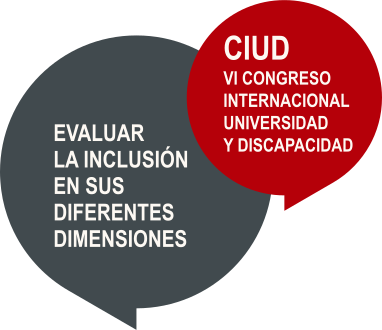VI International Congress on University and Disability
MOVING TOWARDS INCLUSIVE UNIVERSITY MODELS
Evaluating inclusion in its various dimensions
October 25-27, 2023
On-site and virtual format
Venue: UNIVERSITY OF SALAMANCA
Salamanca, Spain
Download the order in which the papers will be presented
DESCRIPTION AND OBJECTIVES OF WORKING GROUPS (WG)
| WORKING GROUP 1 | Inspiring Practices of Inclusive Universities |
|---|
This working group aims to share national and international good practices that are being developed to make universities an inclusive space where students with disabilities, teaching and research staff, and administrative personnel have equal opportunities and appropriate reasonable adjustments. Communications and research addressing teaching experiences, student experiences, and comprehensive experiences of inclusive university policies are welcome, sharing experiences ranging from university access to support policies, promotion, and equity guarantees. Communications that propose innovative teaching experiences and faculty training in inclusion are also expected.
| WORKING GROUP 2 | Universal Accessibility, Cognitive Accessibility, and Universal Design for Learning and Participation |
|---|
Without access to the physical environment, information, communications, and other university services, students with disabilities do not have equal opportunities to exercise their right to education. Inaccessibility to spaces, environments, services, and teaching methodologies continues to be a problem in many cases for students with disabilities. In this regard, this working group provides a space for discussion on access and freedom of movement throughout the university and its facilities, as well as technological and digital accessibility, accessibility in curriculum content, and everything related to the full participation of students in the activities and services offered by the university.
| WORKING GROUP 3 | Regulations, Public Policies, and Inclusive Education |
|---|
This working group welcomes communications on legislative frameworks, laws, regulations, plans, and public policies that guarantee the full implementation of the rights recognized in the Convention on the Rights of Persons with Disabilities. It provides a space for analysis and reflection on the situation of inclusive education in the university stage from a human rights perspective. The starting point can be the existing legal barriers and deficiencies in public policies. Communications with a propositional and pragmatic approach are expected, which, through comparative law, contribute to the advancement of university inclusion. The communications in this working group will allow an understanding of the normative evolution in different countries and its impact on the progress of real and effective equality in education.
| WORKING GROUP 4 | Employment, Entrepreneurship, and New Professional Opportunities |
|---|
People with disabilities have the right to work on an equal basis with others, which implies, as indicated in the Convention on the Rights of Persons with Disabilities, a free choice of employment and an open, inclusive, and accessible work environment for people with disabilities.
In this working group, communications on inclusive employment initiatives and innovations are also expected. This can include best practices in promoting the employment of people with disabilities in both the public and private sectors, as well as initiatives that promote entrepreneurship among university students with disabilities and new job opportunities linked to the digital economy.
| WORKING GROUP 5 | Technologies Applied to Inclusive Education: Tools and Experiences |
|---|
This working group provides a platform for communications that explore the implementation of technology accessibility and digital transformation, as well as the opportunities that technologies offer to facilitate inclusion in the university educational space. It includes the impact of new and innovative technologies. Both self-initiated or research group projects and elements incorporated by teachers are accepted. Additionally, it considers elements that students with disabilities use in their day-to-day activities as an alternative to direct participation and interaction with faculty and administrative services.
| WORKING GROUP 6 | Inclusive Practices of Students with Intellectual, Developmental, or Autism Spectrum Disabilities in the University Environment |
|---|
It has been proven that the training of individuals with intellectual disabilities in the university environment positively affects their employment integration, as well as their autonomy and academic development. Communications received in this working group should address proposals, research, and good practices of university education aimed at young people with intellectual disabilities. These practices should facilitate comprehensive and personalized education to enable their participation in the community on an equal basis with others. The objective of this discussion is to advance knowledge about projects, experiences, and ideas that guarantee the right to higher education for individuals with intellectual, developmental, or autism spectrum disabilities.
| WORKING GROUP 7 | Educational Policies and Academic and Career Guidance to Facilitate Transitions to Higher Education |
|---|
People with disabilities still encounter barriers to accessing higher education. Data indicates that over 50% of students with disabilities drop out after secondary education. In this working group, communications will address inclusive academic guidance programs that facilitate transitions to higher education, as well as pre-university educational best practices that reinforce the academic progress of students with disabilities and prevent early school dropout among this group.

